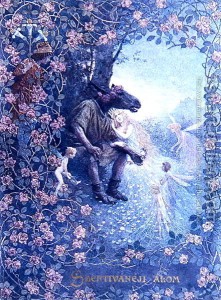The role and character of Puck, or Robin Goodfellow, in A Midsummer Night’s Dream, is not only entertaining but quite useful. William Shakespeare seems to have created the character of Puck from his own childhood. In Shakespeare’s time, it was believed that fairies and little people did exist.
Whenever something went wrong around the farmyard or house or village, incidents such as buckets of milk ‘accidentally’ spilling over, or tools suddenly disappearing, or doors opening for no reason, it was blamed on ‘ those damn little people!’. The idea of Puck’s character is a lovely one. One can’t help but be attracted to him and his innocent, little pranks.
He is also known by the name Robin Goodfellow. The audience can only see this ‘Robin Goodfellow’ side of Puck when he is trying to fix something he disrupted, hence the name Goodfellow.
When compared to Oberon, King of the Fairies and Titania, Queen of the Fairies, and the remaining fairies of the play, Puck does not seem to fit in as well. While Oberon and Titania belong to the forest and the world of dainty fairies, a small village setting seems more appropriate for Puck.
He is the type of fairy that likes to be around mortals and cause them trouble, as opposed to other fairies. This is why Puck’s little job with a love potion and a young couple is perfect for him and he perfect for the job. Puck is a likable character who tends to create mischief around himself. Everything is a game to crafty little Puck. Yet once he realizes that he has caused a problem he will make sure to the best of his ability and power that it is rectified.
As in the scene with Hermia and Lysander, and Helena and Demetrius. When Puck mistook Lysander for Demetrius (Shakespeare conveniently had the characters look alike or ‘only slightly individualized’) and dropped the love-juice into Lysander’s eyes and then (with help from Oberon) realized what he had done he knew he had to fix it. Shakespeare conveniently created ‘Puck’ to add some probability to the play. Since the typical audience believed in fairies and little people, Puck could be convincing in his role.
It is possible, even today, more plausible to have a little fairy running around causing problems than to have to try and believe that fate and destiny were the cause of all the joy, sadness, and bad luck.
When William Shakespeare created ‘Puck’ it seems as though the play got much more out of the character than intended. This is nice however, as the audience we tend to like Puck and follow him in a light-hearted, amusing manner. The character of Puck keeps the play rolling and everything turns out well in the end, unlike many other plays of Shakespeare.


Shakespeare absolutely did not create Robin Goodfellow or Puck. Robin is an ancient character of British and Celtic mythology who many people genuinely believe existed for a long time before “A Midsummer Night’s Dream.”